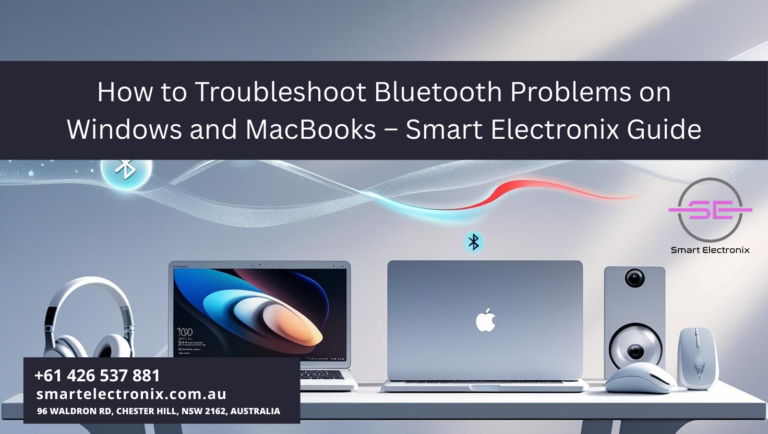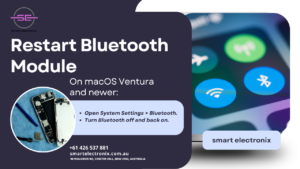
We’ve all been there — you sit down to connect your wireless headphones, mouse, or keyboard, and suddenly, Bluetooth decides to act up. In 2025, Bluetooth technology is more reliable than ever, but issues still happen, especially on Windows laptops and MacBooks. The good news is that troubleshooting doesn’t have to be stressful. With the right approach, you can resolve most problems quickly without needing a technician. At Smart Electronix, we want to help you make the most of your devices, so let’s dive into practical steps to fix Bluetooth problems.
Common Causes of Bluetooth Issues
Before we start fixing, it’s important to understand why these problems happen. Common reasons include:
- Outdated drivers or system updates.
- Interference from other wireless devices.
- Incorrect settings or disabled Bluetooth services.
- Hardware conflicts or paired device limitations.
Knowing the cause makes it easier to apply the right solution.
Step-by-Step Guide for Windows Users
1. Ensure Bluetooth is Enabled
This sounds simple, but it’s the most common issue. Go to Settings > Devices > Bluetooth & other devices and check if the switch is on.
2. Restart Bluetooth Services
Sometimes the background services stop working. To fix this:
- Press
Win + Rand typeservices.msc. - Locate Bluetooth Support Service.
- Right-click > Restart.
3. Update Bluetooth Drivers
Outdated drivers cause major connection failures. To update:
- Open Device Manager.
- Expand Bluetooth.
- Right-click your adapter > Update driver.
4. Remove and Reconnect the Device
If your headset or keyboard still doesn’t work:
- Go to Bluetooth & devices.
- Remove the device.
- Re-pair it by clicking Add device.
5. Check Airplane Mode
Sometimes Windows enables Airplane Mode by accident. Disable it from the taskbar or settings.
Step-by-Step Guide for MacBook Users
1. Restart Bluetooth Module
On macOS Ventura and newer:

- Open System Settings > Bluetooth.
- Turn Bluetooth off and back on.
2. Remove Interfering Devices
If your MacBook is paired with too many gadgets, remove unused ones to free up the connection.
3. Reset Bluetooth Settings
- Hold Shift + Option and click the Bluetooth icon in the menu bar.
- Select Reset the Bluetooth module.
- Reconnect your devices.
4. Update macOS
Keeping your MacBook updated ensures compatibility with the latest accessories. Go to System Settings > General > Software Update.
5. Reset PRAM/NVRAM (if needed)
In rare cases, resetting PRAM helps:
- Shut down your Mac.
- Restart while holding Option + Command + P + R.
- Release after 20 seconds.
Universal Fixes for Both Windows and MacBooks
- Restart your device – A quick reboot clears minor glitches.
- Move closer to the device – Distance or walls can weaken signals.
- Check battery levels – Low power on headphones or mice can prevent pairing.
- Remove interference – Wi-Fi routers, microwaves, and other electronics can interfere.
Preventing Future Bluetooth Issues
Fixing problems is great, but preventing them is better. Here’s how you can avoid future frustrations:
- Keep your drivers and system updated.
- Regularly remove unused paired devices.
- Avoid overloading your Bluetooth with too many simultaneous connections.
- Invest in high-quality accessories that are fully compatible with your system.
When to Seek Professional Help
If nothing works, your Bluetooth adapter or logic board may have a hardware fault. At Smart Electronix, we offer reliable repair and replacement services for both Windows laptops and MacBooks.
 Instead of struggling endlessly, let professionals handle it.
Instead of struggling endlessly, let professionals handle it.
Final Thoughts
Bluetooth makes modern computing more convenient, but issues can still creep in. Thankfully, most connection problems have simple fixes, whether you’re on Windows or macOS. By following these steps, you can save time and keep your workflow uninterrupted. And if you ever need expert support, Smart Electronix is here to guide you with repairs, upgrades, and trusted advice.
Smart Electronix (https://smartelectronix.com.au/) – Helping you stay connected, one device at a time.
